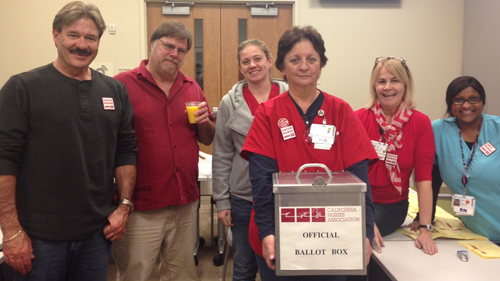Press Release
Breakthrough – Tentative Pacts for Sutter Alta Bates, Cal Pacific Hospital RNs

Registered nurses at some of the biggest hospitals in San Francisco and the East Bay have reached breakthrough agreements with Sutter Health, capping a wave of contract settlements for some 8,000 RNs that follow years of contentious disputes that have in prior years included short term strikes and other multiple protests, the California Nurses Association/National Nurses United announced today.
The new tentative pacts, concluded Wednesday afternoon, cover RNs who work Alta Bates Summit Medical Center facilities in Berkeley and Oakland and California Pacific Medical Center hospitals in San Francisco, including the first ever contract for nurses at CPMC’s Pacific campus, St. Luke’s and CPMC’s California campus. RNs at CPMC will vote on the proposed agreement on Wednesday and Thursday next week, Alta Bates will vote on Thursday, March 10.
The CPMC Pacific RNs, who voted to join CNA/NNU two years ago, join with St. Luke’s and CPMC California in a contract covering all three facilities.
CNA and NNU Executive Director RoseAnn DeMoro said that “corporate greed sweeping the nation inspired Sutter” in its intent over several years to insist on “massive takeaways” from Sutter RNs. “But they didn’t know their nurses. The union did. I’m very proud of the Sutter nurses. They turned it all around to get great improvements and a better Sutter.”
“Our solidarity and perseverance with our Pacific and California campus brothers and sisters were critical components in achieving a contract that best suits the needs for nurse and patient advocacy,” said Jane Sandoval, an emergency room RN at St. Luke’s who was a leader in the fight to keep the hospital open. “Moving forward with collective strength, it is our honor to carry the torch of solidarity and equity for all CPMC nurses.”
“It has been a great privilege to be a part of bringing a competitive first contract to my well-deserving colleagues at CPMC Pacific and a renewed contract for our sisters and brothers at St. Luke's and California,” said CPMC Pacific RN Lea Ejanda. “Through pure grit, we have worked toward conditions that will serve our patients, our community, and our nurses well.”
Both pacts featured significant pay increases, new health and safety provisions, and strengthened benefits. All Alta Bates RNs will earn pay increases of 24 to 28 percent over four years, depending on years of service. CPMC RNs will all receive increases of 20-27 percent over four years.
Mike Hill, an intensive care RN at Alta Bates Summit in Oakland said the nurses were “ecstatic” to reach an agreement. “We won provisions that raise our standards and go a long way towards retaining experienced RNs and recruiting new nurses.”
“We nurses at CPMC demanded patient safety and we won,” said Gideon Rojas, pediatric transport RN at CPMC California. “I am so proud to be working with nurses who are relentless in the fight for their patients and the communities we live in.”
In contrast with the prior disputes, the negotiations were not clouded with demands for sweeping reductions in RN economic, workplace, or patient safety standards. The new agreement includes improvements in long-term disability, dental and vision coverage for the RNs.
On health and safety, the contracts stipulate that bedside RNs will be involved in planning and prevention for the Ebola virus, a major concern in 2014 when several patients and two RNs were infected with the virus in the U.S. The provision also sets a precedent for addressing other possible epidemics, itself a notable achievement with growing concern over the Zika virus and other contagious diseases.

Alta Bates Summit nurse negotiators
“This agreement symbolizes that nurses are united in our strength and that our collective voices were heard,” said Alta Bates Berkeley’s Ann Gaebler, a neonatal intensive care RN. “Sutter knew we were prepared, and we are confident that this settlement will significantly improve the lives of patients and nurses.”
The RNs also persuaded Sutter to end the practice of using unpaid RN internships, a program in which recent RN graduates were required to work without pay, or in some cases actually paying thousands of dollars for the “experience” of the program, while carrying out full RN assignments. Now the interns will be covered by the union contract, with full pay.
The Alta Bates and CPMC agreements follow a wave of other CNA-Sutter settlements at Sutter Delta in Antioch, Eden Medical Center in Castro Valley, Novato Community Hospital, and Sutter Solano in Vallejo, Mills-Peninsula Health Services Hospitals in Burlingame and San Mateo, Sutter Roseville, Sutter Santa Rosa, Sutter Tracy, Sutter Lakeside, and Auburn Faith. The only CNA affiliated Sutter contracts remaining are for two small Visiting Nurses facilities in Santa Cruz and a contract for technical workers at Alta Bates Summit.
Agreements were reached with RNs at Tracy, Auburn, Roseville, Lakeside and Santa Rosa in December, at Mills-Peninsula and Solano in January, and Novato, Eden, and Delta last month.
“I’m very proud of achieving a contract agreement that upholds the values of our nurses to improve patient care and retain skilled nurses who take care of our patients. This agreement will put us on the map with other Bay Area hospitals and help recruit qualified nurses," said Carol Hawthorne-Johnson, an intensive care unit RN at Eden.
At Eden all RNs will earn across the board pay hikes of 21 to 25 percent. At Sutter Delta the pay hikes range from 18 to 22 percent. Both contracts include improved dental and vision coverage, and a new Sutter paid long term disability benefit, along with language on Ebola health and safety provisions, and elimination of the unpaid interns.
"We are very excited to secure a contract that helps recruit new nurses, retain experienced ones, and offers better patient care provisions," said Amy Black, pediatrics RN at Sutter Delta.

RN leaders at Eden ratification meeting
Sutter Solano, whose contract was focused on wages and health coverage, includes wage increases of up to 16 percent over the four years, as well as several improvements in health benefits.
All the contracts will expire on January 31, 2020.